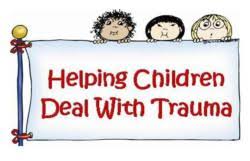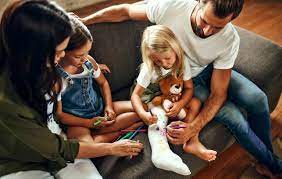
INDIANA – As parents and caregivers, we want our children to feel safe, happy, protected, and cared for. However, we can’t always be with them as much as we’d like.
Children make choices on their own every day at school, friends’ houses, summer camps, social media, and even at home when parents are away. Every choice a child makes has consequences, either positive or negative.

Unfortunately, between peer pressures, social media influence, and immaturity, children sometimes make a choice that leads to a traumatic experience. Even if we are with our children, a traumatic event such as a car crash, witnessing a robbery, or sheltering together at home during a weather disaster could occur.
After a traumatic experience, children can show signs of anxiety, depression, post-traumatic stress disorder, intense emotional upset, academic and attention difficulties, nightmares, and changes in their sleeping and eating habits. No matter what traumatic experience took place, a child might react differently than others involved in the same experience.

Everyone experiences trauma and deals with the aftermath in their way, whether they experienced it together or not. Children are often more resilient than adults when dealing with a traumatic experience. Because the neural pathways of their young brains are still developing, it is crucial to seek out mental health counseling for a child after this type of event. The more we engage and reinforce healthy pathways, the better we can support the mental and emotional well-being of the child.
Although we never want to think about our children being in a traumatic situation, there are resources to utilize if needed. Along with seeking out a therapist or mental health counselor for your child, you can also help them through their healing journey. It is essential to talk about the traumatic event with your child, even if it is uncomfortable. If you do not openly discuss the event with your child, it will be harder for them to accept what happened and move on from the experience.

You should take their feelings seriously. You may have to reassure your child repeatedly and listen to the same concerns. They might want to talk repeatedly about their traumatic experience, or maybe not at all. Either way, you must check in with them and make sure they feel safe.
According to the Substance Abuse and Mental Health Services Administration (SAMHSA), more than two-thirds of children reported at least one traumatic experience by age sixteen. The reality is that traumatic experiences happen every day, and while it is frightening to think about, it is essential to know how to help a child if needed. The child might not fully recover or completely forget about their traumatic experience. Still, with the resources mentioned in this article, they will most definitely be able to live a happier, more fulfilling life.

Audrey Bowlds, MSW, LSW, is a Youth First Social Worker at Oak Hill Elementary School in Vanderburgh County. Youth First, Inc., is a nonprofit dedicated to strengthening youth and families. Youth First provides 90 highly trained mental health professionals (primarily master’s level social workers), prevention programs, parent engagement coordinators, and bilingual support personnel to 125 schools across 14 Indiana counties. Over 50,000 youth and families per year are served by Youth First’s school-based social work and community programs that promote mental health, prevent substance misuse, and maximize student success. To learn more about Youth First, visit youthfirstinc.org or call 812-421-8336.



